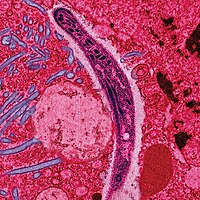
Photo from wikipedia
Dengue, caused by dengue virus (DENV) infection, is a public health problem worldwide. Although DENV pathogenesis has not yet been fully elucidated, the inflammatory response is a hallmark feature in… Click to show full abstract
Dengue, caused by dengue virus (DENV) infection, is a public health problem worldwide. Although DENV pathogenesis has not yet been fully elucidated, the inflammatory response is a hallmark feature in severe DENV infection. Although vitamin D (vitD) can promote the innate immune response against virus infection, no studies have evaluated the effects of vitD on DENV infection, dendritic cells (DCs), and inflammatory response regulation. This study aimed to assess the impact of oral vitD supplementation on DENV-2 infection, Toll-like receptor (TLR) expression, and both pro- and anti-inflammatory cytokine production in monocyte-derived DCs (MDDCs). To accomplish this, 20 healthy donors were randomly divided into two groups and received either 1000 or 4000 international units (IU)/day of vitD for 10 days. During pre- and post-vitD supplementation, peripheral blood samples were taken to obtain MDDCs, which were challenged with DENV-2. We found that MDDCs from donors who received 4000 IU/day of vitD were less susceptible to DENV-2 infection than MDDCs from donors who received 1000 IU/day of vitD. Moreover, these cells showed decreased mRNA expression of TLR3, 7, and 9; downregulation of IL-12/IL-8 production; and increased IL-10 secretion in response to DENV-2 infection. In conclusion, the administration of 4000 IU/day of vitD decreased DENV-2 infection. Our findings support a possible role of vitD in improving the innate immune response against DENV. However, further studies are necessary to determine the role of vitD on DENV replication and its innate immune response modulation in MDDCs.
Journal Title: Molecular and Cellular Biochemistry
Year Published: 2019
Link to full text (if available)
Share on Social Media: Sign Up to like & get
recommendations!